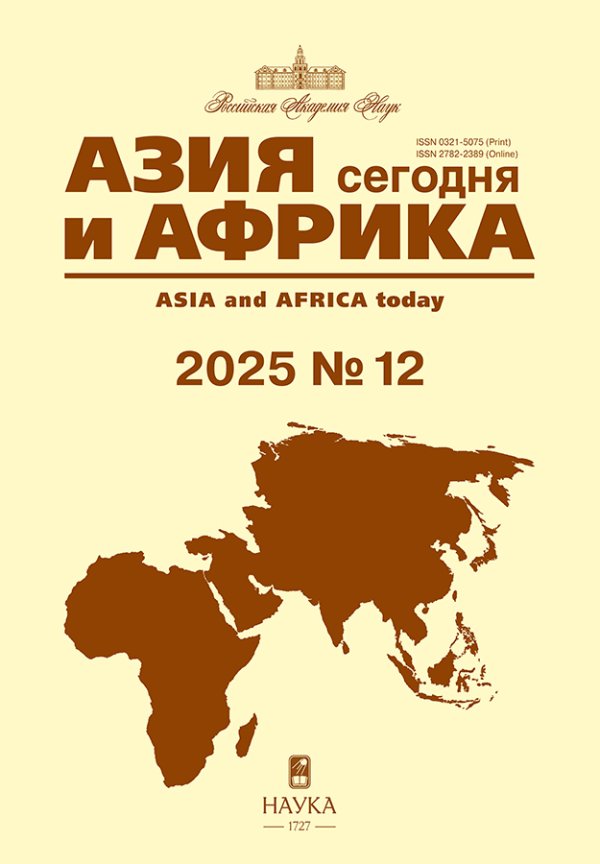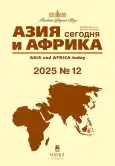No 12 (2025)
Top problem
Russia–Niger: Dialogue between Academies of Sciences and Opportunities for Scientific and Educational Cooperation
Abstract
The article analyzes the prospects for scientific and educational cooperation between Russia and Niger, considering the historical context as well as the political, economic, and social changes that occurred after the July 2023 coup. The study is based on the author's personal observations and meetings during a visit to Niamey in February 2025. The author concludes that the coup in Niger, as in other countries of Francophone Africa, was driven by much deeper causes than the officially declared fight against corruption – namely, resistance to a new type of French colonialism. Following the collapse of the colonial system in Africa, France continued to exploit African nations by maintaining economic, military, cultural, and informational influence over them. Today, Niger, like many other African states, is striving to free itself from modern forms of colonialism in all spheres of life, including science and education, and looks to Russia for support in this struggle.
Asia and Africa Today. 2025;(12):5-15
 5-15
5-15


Politics, economics
The U.S. and the EU Reaction on Syria's Change of Power
Abstract
The article is devoted to a comparative analysis of the approaches taken by the U.S. and the EU toward the change of power in Syria that occurred in December 2024. It examines each side's stance toward the old and new Syrian governments, changes in sanctions regimes, approaches to geopolitical adversaries such as Russia and Iran, as well as policies regarding Turkey, the Islamic State*, and Israel. The article concludes that for the U.S. – especially during the Trump administration – the primary focus lies in ensuring Israel's security and eliminating Iranian influence in Syria. In contrast, the EU emphasizes creating conditions for the repatriation of Syrian refugees and geopolitical confrontation with Russia. These differences may eventually lead to a strategic divergence between the U.S. and the EU in their respective policies on Syria.
Asia and Africa Today. 2025;(12):16-25
 16-25
16-25


Algeria since 2019… What has Changed?
Abstract
The article provides an assessment of A.Tebboune's presidency, which continued with his re-election to a second term in 2024. With an eye to the youth unrest in Morocco in the fall of 2025, the paper reveals the reason for the failure of such insurgency in Algeria. In summary, it is concluded that the Algerian regime is relatively stable, which is ensured by the implementation of gradual reforms that reflect the aspirations of the Hirak (or The Revolution of Smiles) movement, as well as increased attention to social policy. Socio-economic indicators show that, after the 2019 crisis, associated with the fall in hydrocarbon prices, and the COVID-19 pandemic, Algeria was able to achieve sustainable economic growth by 2023. Unfavorable regional dynamics force the Algerian government to maintain military spending, but a multi-vector pragmatic foreign policy allows Algeria to remain a reliable political, trade and economic partner.
Asia and Africa Today. 2025;(12):26-34
 26-34
26-34


Cooperation of Russia and China in Digital Economy: Opportunities and Limitations
Abstract
Opportunities for cooperation between Russia and China in the digital economy are proposed: high levels of digital economy development in the two countries; rapprochement of the Russian and Chinese economies in the face of barriers from Western countries; the need to re-equip Russian mobile networks based on Chinese components; promising participation of Russia in the framework of China’s Belt and Road Initiative; implementation of joint digital technologies in some sectors of the economy. The limitations of Russian-Chinese cooperation in the digital economy in the current conditions were identified: risks of secondary sanctions and security; lack of an integration agreement; uneven development of the digital economy in neighboring regions of the two countries; insignificant presence of Russia in global production chains and Russia’s small market. It is shown that by reducing barriers, the two countries can expand economic interactions, and cooperation in the digital economy can help this.
Asia and Africa Today. 2025;(12):35-44
 35-44
35-44


Cultural Heritage of Africa in the Era of Globalization: State and Problems of Preservation
Abstract
At the beginning of the 21st century, African countries face the important task of preserving and using cultural heritage as the basis of historical consciousness, a factor in maintaining and developing their own cultural identity in the context of globalization. The article examines the types of African cultural heritage, the diversity and uniqueness of its historical forms, the territorial distribution of African World Cultural Heritage sites, the efforts of African states to restore the ancient heritage fund and include its iconic monuments in the list of world cultural heritage sites, global risks and threats of loss of heritage sites. It is concluded that it is impossible to preserve the cultural heritage of Africa without the development of broad and organized regional and global cooperation to protect the cultural heritage of countries and peoples, and to ensure the humanitarian security of countries and peoples of the continent. It is necessary to coordinate the actions of UNESCO, the UN, major world powers to prevent the activities of terrorist groups in order to reduce the risks and threats of losing cultural heritage sites and objects.
Asia and Africa Today. 2025;(12):45-53
 45-53
45-53


The Religious Shift in Post-Apartheid South Africa
Abstract
This article examines the religious shift or profound religious transformations in South Africa from 1996 (first census after the demise of apartheid) to 2022 (most recent census) from rigid apartheid to a dynamic and pluralistic religious landscape. Among major transformations are a decline of mainline churches (Anglican and Methodist) and a rapid rise of Pentecostal and Charismatic movements. Not least, the African Independent Churches (AICs), which blend Christian doctrines with traditional African beliefs, are getting the upper hand. Moving above and beyond quantitative census data, the paper explores the deeper drivers of these changes, with focus on socio-economic trends in post-apartheid South Africa. This holistic approach reveals how religious transformations impact broader societal development. The analysis distinguishes between a “top-down” religious turn (reflecting state-led pluralism and secularization) and a “bottom-up” turn (less visible but exerting long-term societal influence through the values promoted by dominant churches).
Asia and Africa Today. 2025;(12):54-63
 54-63
54-63


Post-graduate tribune
Institutional Aspects of the Formation of the East African Community Common Labour Market
Abstract
The article is devoted to the study of the dynamics of institutional integration of the East African Community (EAC) member states. The method of scoring the regulatory framework was used to analyze the totality of the EAC constituent documents and additional factors influencing the transformation of the labour market. 12 indicators were collected that form the “framework” of the functioning of the common labour market. The index method was used to calculate the progress of the EAC as a whole and each member state for 1999–2024. The following patterns were established in the common labour market: dependence of institutional integration on work at the national and supranational levels; negative impact of territorial expansion of the regional bloc on the depth of integration; aggravation of heterogeneity and increase in differentiation of member states. Despite the aspirations for regional integration, at the moment only some of the states are full-fledged participants in the common labour market. Only by the second half of the 2030s will it be possible to form de facto functioning mechanisms for cross-border labour mobility of the population between the EAC member states.
Asia and Africa Today. 2025;(12):64-71
 64-71
64-71


Scientific life
National Sovereignty and Personnel Training – Pillar of Russian-African Raw Materials Cooperation
Abstract
The paper presents a brief overview of the first Russian-African Raw Materials Dialogue, which was held in St. Petersburg from October 29 to November 1, 2025. The main goal of this event was to develop specific mechanisms and recommendations for intensifying Russian-African cooperation in the mineral resources sector, including improving government regulation, implementing advanced technologies, and training highly qualified personnel. The event included two panel discussions and five roundtables, featuring over 50 presentations. The first panel discussion was moderated by I.Abramova, Director of the Institute for African Studies, Russian Academy of Sciences. The Institute organized a roundtable discussion "Science, Technology, and Education for Building Economic Capacity of Russia and Africa", during which leading Russian and African scientists shared their proposals for the development of cooperation between Russia and Africa. The paper collects, structures and develops key ideas and proposals for further expansion of cooperation in the raw materials sector.
Asia and Africa Today. 2025;(12):72-76
 72-76
72-76


Book review
 77-80
77-80













